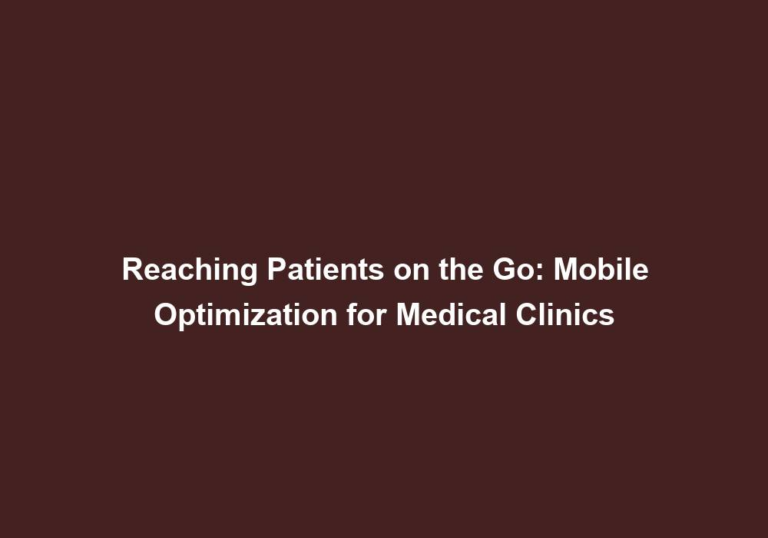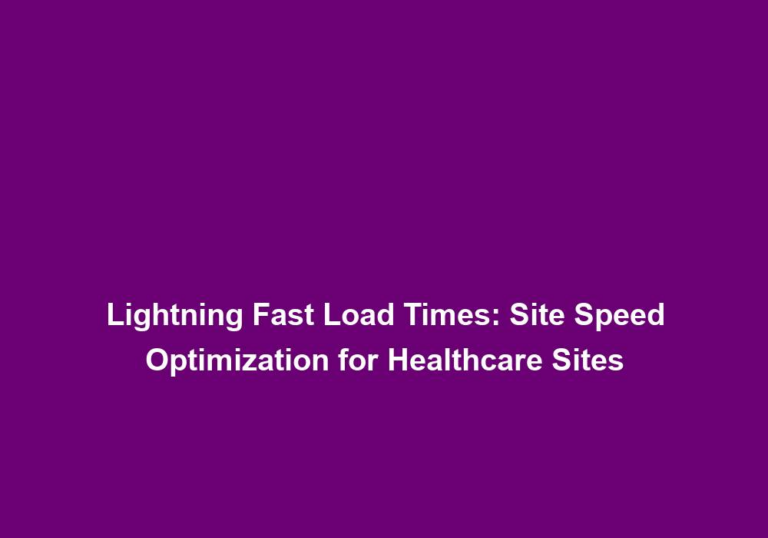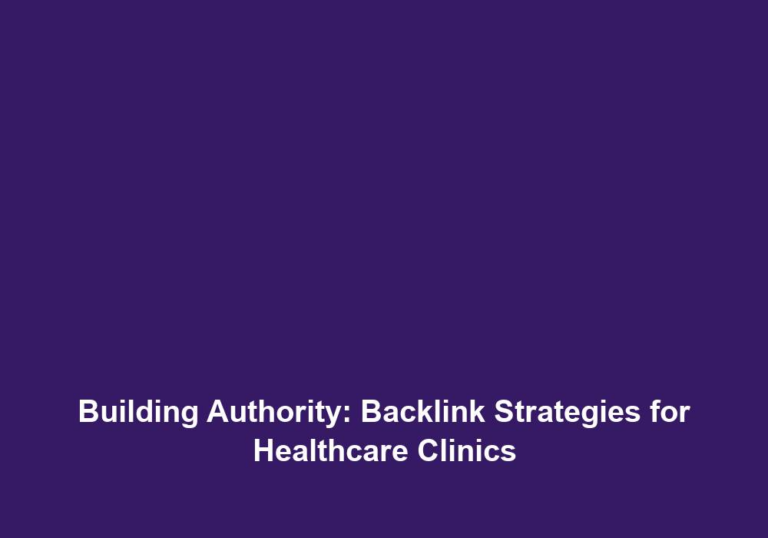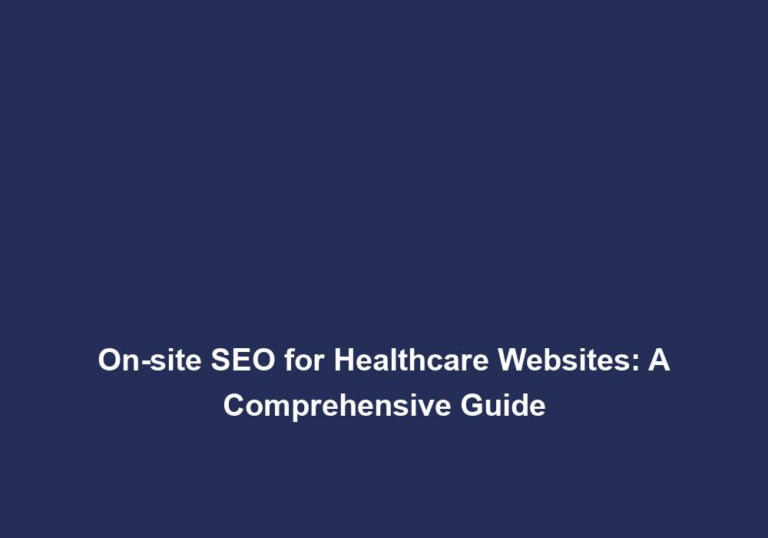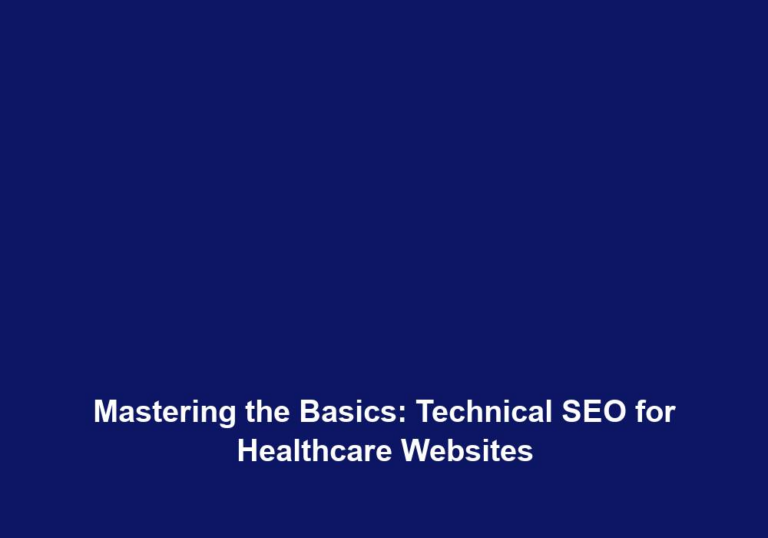Beyond Your Website: Leveraging Off-site SEO in Healthcare Marketing
In the ever-evolving digital landscape, it has become imperative for healthcare marketers to optimize their online presence not only within their own websites but also beyond. Off-site SEO, also known as off-page SEO, plays a crucial role in driving organic traffic, enhancing brand visibility, and establishing credibility in the healthcare industry. In this article, we will delve into the key aspects of off-site SEO and explore effective strategies to leverage it for successful healthcare marketing.
Understanding Off-Site SEO
Off-site SEO refers to all the optimization efforts that are conducted outside of your own website to improve its search engine rankings. While on-site SEO focuses on optimizing your website’s content, structure, and technical elements, off-site SEO concentrates on building your website’s authority, reputation, and trustworthiness across the web.
The Importance of Off-Site SEO in Healthcare Marketing
Off-site SEO holds immense significance for healthcare marketers due to several reasons:
-
Increased Online Visibility: By implementing effective off-site SEO strategies, you can expand your brand’s online visibility beyond your website. This can lead to higher organic search rankings and increased exposure to potential patients.
-
Establishing Authority: Off-site SEO allows you to build authority and credibility in the healthcare industry by securing valuable backlinks from authoritative websites. These backlinks serve as votes of confidence for search engines, enhancing your website’s reputation.
-
Driving Referral Traffic: Off-site SEO efforts, such as guest blogging and social media marketing, can generate referral traffic to your website. This can lead to increased patient engagement and conversions.
Off-site SEO is a multifaceted approach that involves various strategies to enhance your healthcare marketing efforts. Here are some key strategies that healthcare marketers can leverage to optimize their off-site SEO:
1. Content Marketing and Guest Blogging
Content marketing and guest blogging play a pivotal role in building backlinks and expanding your brand’s online presence. By creating high-quality, informative content related to healthcare topics, you can attract authoritative websites to link back to your content. This not only helps in improving your website’s visibility but also establishes your thought leadership in the industry.
In addition to creating valuable content, guest blogging on reputable healthcare websites allows you to tap into their audience and establish credibility. By sharing your expertise and insights through guest posts, you can gain exposure and secure valuable backlinks that enhance your website’s authority.
Some tips to make the most of content marketing and guest blogging for off-site SEO include:
- Conducting thorough research to identify relevant healthcare websites for guest blogging opportunities.
- Creating compelling and well-researched content that provides unique insights and value to readers.
- Including relevant internal and external links within your content to improve its SEO value.
- Promoting your guest posts through social media and other channels to maximize their reach and impact.
2. Social Media Engagement
Social media engagement is not only crucial for patient communication but also plays a significant role in off-site SEO. By actively participating in relevant healthcare conversations on social media platforms, sharing valuable content, and engaging with your target audience, you can increase brand visibility and encourage others to share your content, leading to improved search rankings.
To leverage social media for off-site SEO in healthcare marketing, consider the following strategies:
- Identify the social media platforms that are most popular among your target audience and establish a strong presence on those platforms.
- Share informative and engaging content related to healthcare topics to attract and retain followers.
- Encourage social sharing and engagement by asking questions, conducting polls, and responding to comments and messages promptly.
- Collaborate with influencers and industry experts to amplify your reach and credibility on social media.
3. Online Directories and Listings
Listing your healthcare practice or organization on reputable online directories and listings can significantly enhance your off-site SEO efforts. These directories serve as valuable sources of information for potential patients and also contribute to your website’s credibility and authority in the eyes of search engines.
When listing your healthcare business on online directories, keep the following tips in mind:
- Choose reputable directories that are relevant to the healthcare industry and have a strong online presence.
- Ensure that your business information, including name, address, phone number, and website URL, is consistent and up-to-date across all directories.
- Optimize your directory listings by providing detailed descriptions, selecting relevant categories, and adding high-quality images or videos.
- Encourage satisfied patients to leave positive reviews on directories, as these reviews can further enhance your website’s visibility and attract more patients.
4. Online Reviews and Testimonials
Positive online reviews and testimonials not only help in building trust and credibility among potential patients but also impact your off-site SEO. Encourage satisfied patients to leave reviews on platforms such as Google My Business, Yelp, and industry-specific review websites. These reviews can improve your website’s visibility and attract more patients.
To effectively leverage online reviews and testimonials for off-site SEO, consider the following strategies:
- Implement a proactive review management system that encourages patients to leave reviews after their experience with your healthcare organization.
- Respond promptly and professionally to both positive and negative reviews to show that you value patient feedback.
- Monitor and engage with online review platforms regularly to address any concerns or questions raised by patients.
- Showcase positive reviews and testimonials on your website and social media platforms to build trust and credibility.
5. Influencer Partnerships and Collaborations
Collaborating with influencers and industry experts can amplify your off-site SEO efforts by leveraging their existing audience and credibility. Seek out healthcare influencers or experts who align with your brand values and engage in meaningful collaborations, such as guest posting, joint webinars, or social media takeovers. These partnerships can significantly increase your brand’s visibility and drive relevant traffic to your website.
When forming influencer partnerships and collaborations, consider the following strategies:
- Identify influencers or industry experts who have a strong online presence and a significant following in the healthcare industry.
- Reach out to them with personalized pitches or proposals that highlight the mutual benefits of collaboration.
- Collaborate on content creation, such as guest blog posts or video interviews, that provide valuable insights and engage their audience.
- Promote the collaboration through your own channels and encourage the influencer to do the same, maximizing the reach and impact of the partnership.
Conclusion
In today’s competitive healthcare industry, off-site SEO has become a critical component of a successful digital marketing strategy. By implementing the strategies mentioned above and consistently monitoring and adjusting your off-site SEO efforts, you can enhance your website’s authority, visibility, and online presence. Remember, off-site SEO is an ongoing process that requires dedication, creativity, and a deep understanding of your target audience. So, start exploring the vast opportunities beyond your website and leverage off-site SEO to take your healthcare marketing to new heights.


